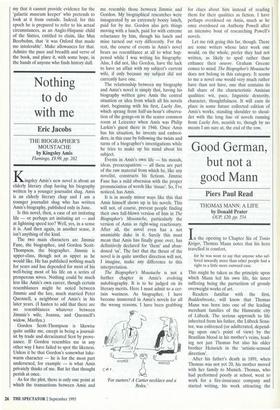Nothing to do with me
Eric Jacobs
THE BIOGRAPHER'S MOUSTACHE by Kingsley Amis Flamingo, £9.99, pp. 282 Kingsley Amis's new novel is about an elderly literary chap having his biography written by a younger journalist shag. Amis is an elderly literary chap and I am a younger journalist shag who has written Amis's biography, published only in June.
Is this novel, then, a case of art imitating life — or perhaps art imitating art — and at lightning speed too? Well, yes, in a sense it is. And then again, in another sense, it isn't anything of the kind.
The two main characters are Jimmie Fane, the biographee, and Gordon Scott- Thompson, the biographer. Jimmie is upper-class, though not as upper as he would like. He has published nothing much for years and has depended for most of his well-being most of his life on a series of prosperous wives. Nothing could be much less like Amis's own career, though certain resemblances might be noted between Jimmie and the late, much married Peter Quennell, a neighbour of Amis's in his later years. (I hasten to add that there are no resemblances whatever between Jimmie's wife, Joanna, and Quennell's widow, Marilyn.) Gordon Scott-Thompson is likewise quite unlike me, except in being a journal- ist by trade and deracinated Scot by prove- nance. If Gordon resembles me in any other way I have failed to spot the likeness. Unless it be that Gordon's somewhat luke- warm character — he is for the most part undersexed, for example — is what Amis privately thinks of me. But let that thought perish at once.
As for the plot, there is only one point at which the transactions between Amis and me resemble those between Jimmie and Gordon. My biographical researches were inaugurated by an extremely boozy lunch, paid for by me. Gordon also gets things moving with a lunch, paid for with extreme reluctance by him, though his lunch and mine turned out very differently. For the rest, the course of events in Amis's novel bears no resemblance at all to what hap- pened while I was writing his biography. Alas, I did not, like Gordon, have the luck to have an affair with my subject's current wife, if only because my subject did not currently have one.
The relationship between my biography and Amis's novel is simply that, having his biography written gave Amis the central situation or idea from which all his novels start, beginning with his first, Lucky Jim, which sprang from half-an-hour's observa- tion of the goings-on in the senior common room at Leicester when Amis was Philip Larlcin's guest there in 1946. Once Amis has his situation, he invents and embroi- ders, in this case by following the twists and turns of a biographer's investigations while he tries to make up his mind about his subject.
Events in Amis's own life — his moods, ideas, preoccupations — all these are part of the raw material from which he, like any novelist, constructs his fictions. Jimmie Fane has a mild obsession with the proper pronunciation of words like 'tissue'. So, I've noticed, has Amis.
It is in mostly minor ways like this that Amis himself shows up in his novels. This will not, of course, prevent people finding their own full-blown version of him in The Biographer's Moustache, particularly the version of Amis as right-wing reactionary. After all, the novel even has a not unamiable duke in it. Surely this must mean that Amis has finally gone over, has definitively declared for 'them' and aban- doned 'us'. The fact that the thrust of the novel is in quite another direction will not, I imagine, make any difference to this interpretation.
The Biographer's Moustache is not a further chapter in Amis's evolving autobiography. It is to be judged on its literary merits. Here I must admit to a cer- tain wariness. As biographer, I have become immersed in Amis's novels for all the wrong reasons. I have been grubbing 'For starters? A Cartier necklace and a Rolex' for clues about him instead of reading them for their qualities as fiction. I have perhaps overdosed on Amis, much as he once overdosed on Anthony Powell after an intensive bout of researching Powell's novels.
Let me risk going this far, though. There are some writers whose later work one would, on the whole, prefer they had not written, as likely to spoil rather than enhance their oeuvre. Graham Greene comes to mind. The Biographer's Moustache does not belong in this category. It seems to me a novel one would very much rather have than not have, one that contains its full share of the characteristic Amisian qualities: wit, pace, linguistic dexterity, character, thoughtfulness. It will earn its place in some future collected edition of Amis's works, standing shoulder to shoul- der with the long line of novels running from Lucky Jim, nearish to, though by no means I am sure at, the end of the row.


















































 Previous page
Previous page